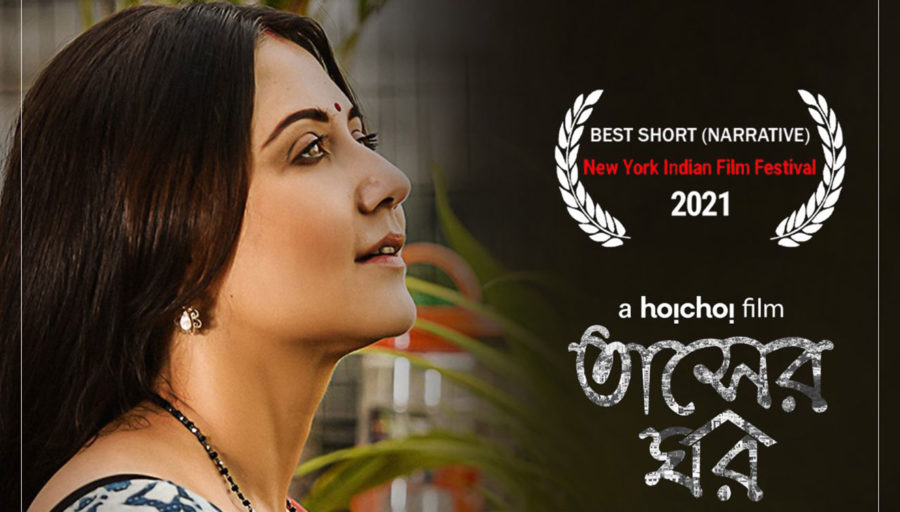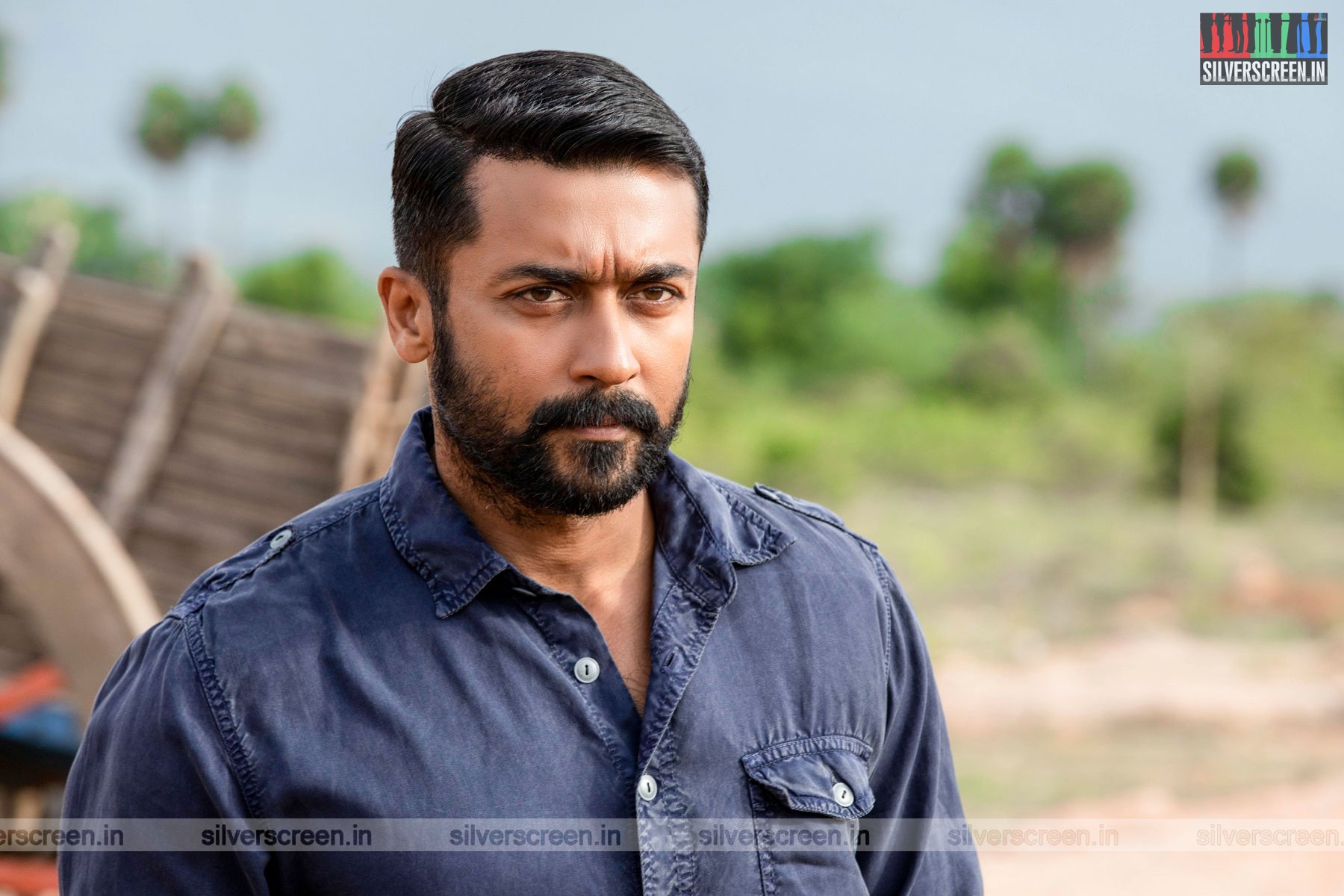Tasher Ghawr, the Bengali short film that won the Best Short (Narrative) Film Award at the New York Indian Film Festival, is the story of a woman in an unhappy marriage who finally decides to take control of her life.
Translating to House of Cards, Tasher Ghawr is the story of a “woman whose life is turned upside down after she is stuck at home with her husband due to the pandemic and the consequent lockdown,” director Sudipto Roy says in conversation with Silverscreen India.
The film, which was released on the Bengali OTT platform Hoichoi on September 3, addresses the issue of domestic violence as a consequence of the Covid-19 lockdown.
Tasher Ghawr begins with Sujata Sengupta, played by Swastika Mukherjee, going about her daily chores with hardly any interaction with her husband (Judhajit Sarkar), apart from him occasionally ordering her about.
Written by Sahana Dutta, the 46-minute film draws different parallels between a woman’s life and her domestic chores. Sujata’s character appears indifferent as she tells the audience of the hardships of her marriage, including her unnamed husband’s extramarital affair and abusive behaviour.
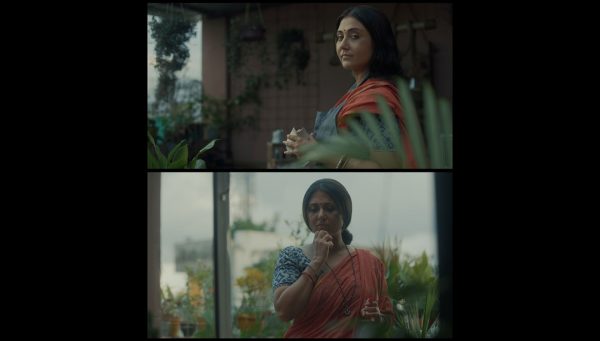
Explaining Sujata’s indifference, the director says, “You have to understand the premise of the story. This couple has been living together for a while, like maybe seven to eight years now, and the woman is stuck in this marriage. And now, due to the lockdown, she is stuck with her husband in the house as well. Before the lockdown, although she was abused and had to go through hardships, she had her own time and the house to herself during the day.”
“The husband now stays at home the whole time, and that is the most difficult part — the most claustrophobic part for Sujata. She would have loved for her husband to go out for work, and then meet his girlfriend, leaving her to herself,” he adds. “And what she does as response to this situation is a very thought out act of rebellion.”
Throughout the film, Sujata talks directly to the audience and makes quips about her situation and her husband’s behaviour. This fourth wall breaking approach sets the film apart, says Roy. “The audience is a part of the narrative all through, and we haven’t seen something like this in India before.”
“And when she is interacting with the audience, why would she create an atmosphere which is dull? She wants to make it funny and lively, share things which are interesting for everyone,” Roy adds, pointing out that Sujata’s monologues and the ways in which she emotes, are all elements of dark comedy.
The idea germinated in Dutta’s mind during the lockdown and she wrote the monologues of the protagonist. Roy was approached to direct the film later and the story underwent a number of changes after that. “It is definitely Sahana Dutta’s idea and her story, however,” the filmmaker says.
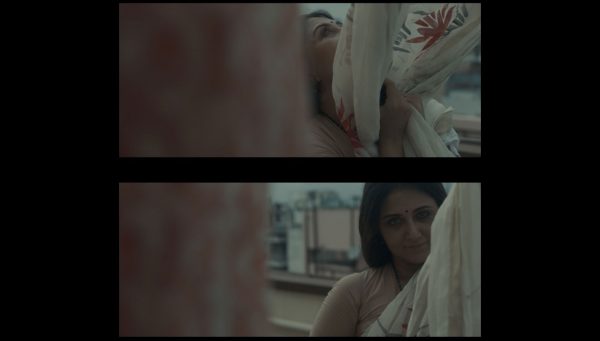
The husband’s face is never shown and he remains unnamed in the film. Roy explains that this is because “the husband can be anyone” and his appearance hardly made any difference in the protagonist’s life.
An interesting aspect of Tasher Ghawr is the significance given to Sujata’s sense of smell. “Gondher o rong hoye, ebong rong er o gondho hoye (Smell has colour just like colour has smell),” Roy quotes a line from the monologue and tells us that while Dutta was penning the story, she shared with him how smell triggered memories for her.
Tasher Ghawr was shot over three days, during the lockdown, in July 2020. Filming in those circumstances came with its own set of challenges. From sanitising the set all the time, to using a minimal crew comprising of just six people, the entire shooting process was difficult, Roy says. “Normally, I would shoot with 20 people but now the workload was much more. And we all had to wear masks in the summer heat. But it was a very interesting experience altogether. And at that time, we thought that this would be the future of filmmaking.”
“Shooting inside a house can be tedious because it’s the same house. How many different frames can you show? How many different angles can you use?” Roy continues, adding, “Plus, when we have Swastika on set, there is a separate kind of preparation that we need in terms of the security. At one point, the neighbours in the building that we shot at, called the police on us!”
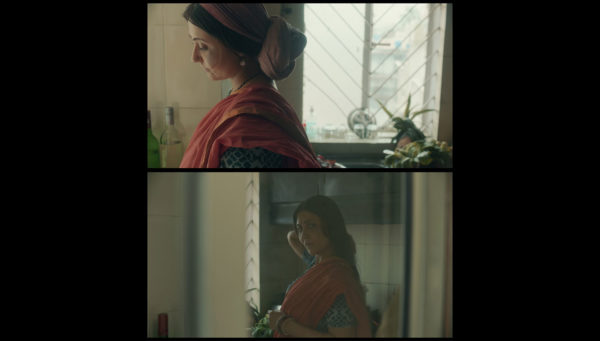
Most of Roy’s films have had women protagonists. His works so far include the feature film Kia and Cosmos and the short film Afternoon Audition, both with Mukherjee as the protagonist.
“Telling women’s stories comes naturally to me. I prefer writing about female protagonists. It’s not that I understand women better but I have spent a lot of time with a lot of women from my very childhood. And going to a co-educational school, I had a lot of female friends whom I saw hit puberty and become women. I also feel it’s very interesting to portray women characters on screen when you are a man yourself,” he says, adding that because his crew comprises a lot of women, he gets inputs from them too.
Roy says the impetus behind the making of Tasher Ghawr lay in its relevance. “During the lockdown, I was reading a lot about domestic violence cases across India. And that makes Tasher Ghawr an important story to tell at this time.”
Recommended
Domestic violence cases witnessed a significant rise during the nationwide lockdown in March 2020. As per a report from the National Commission for Women (NCW), of the 23,722 cases registered under crimes against women, Protection of Women Against Domestic Violence saw 5,297 cases in 2020, becoming the major contributing factor.
An article published by the National Centre for Biotechnology Information concluded that domestic violence emerged as a big “public health threat” during the lockdown in India as well as all over the world.
“I saw a lot of potential in the story because it’s very relevant,” the filmmaker says.
For Roy, the lockdown proved to be a “writing marathon”, and the director is currently working on a short film and a feature film.
Tasher Ghawr is currently available on Hoichoi.
